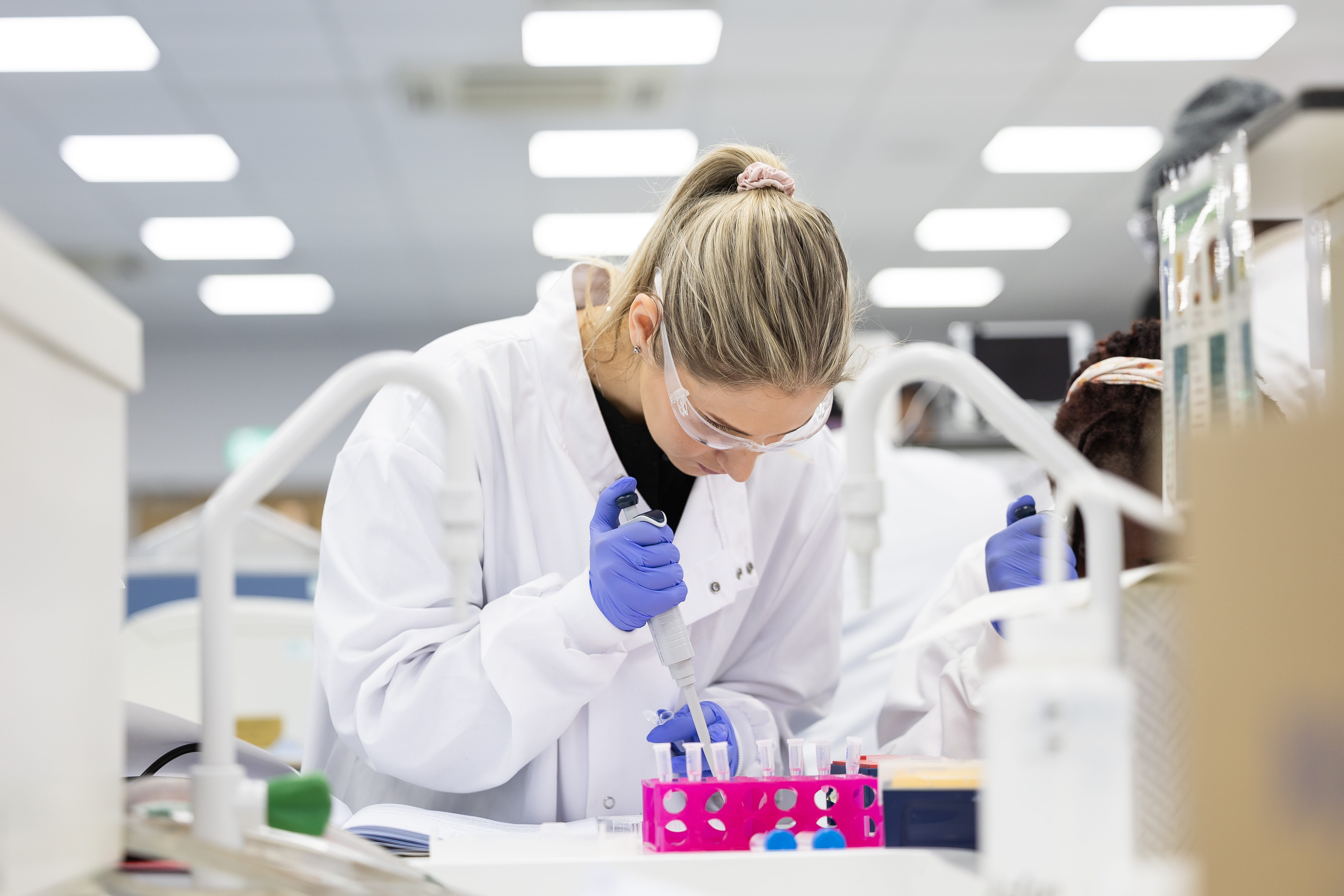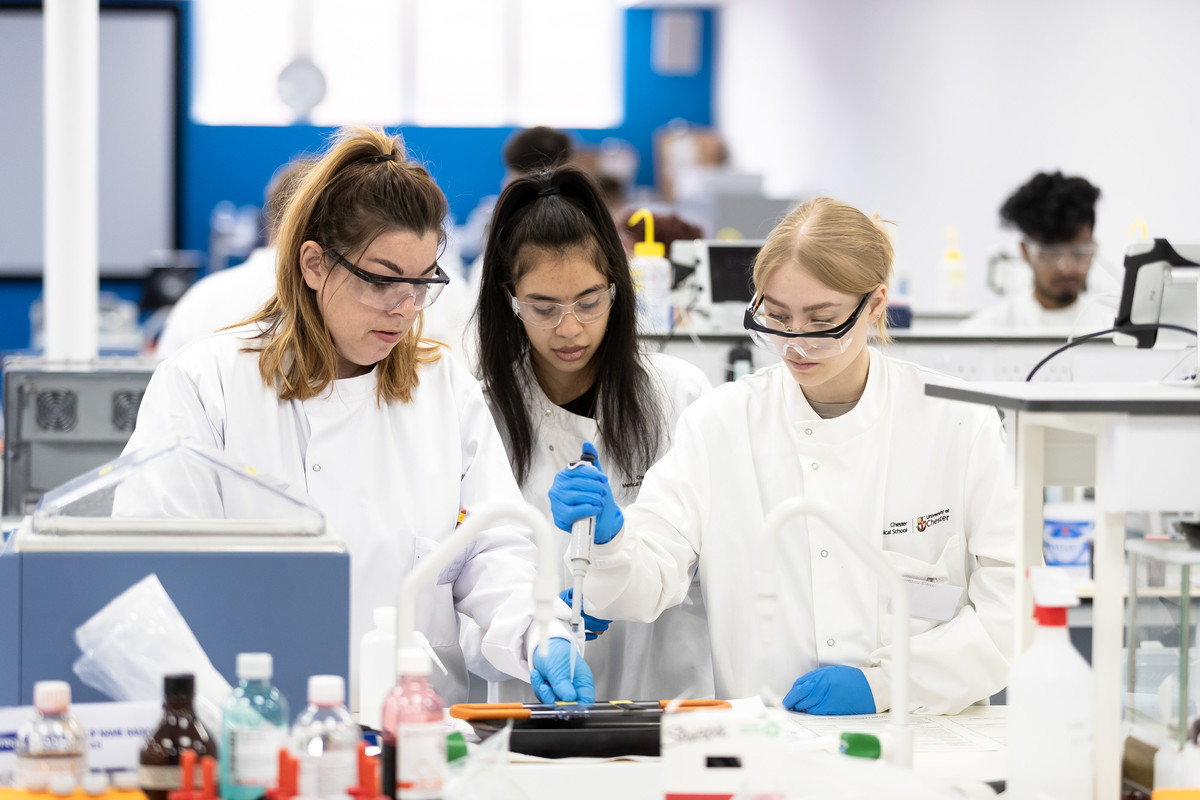Diabetes MSc

This course aims to inform and equip you, the practitioner, with the necessary skills to function in a modern biomedical/clinical environment that specialises in therapeutics for the cancer patient. With the development of modern technologies, the detection and diagnosis of cancer have become more sophisticated. With greater insight into the disease processes comes greater knowledge. This MSc is designed to develop and further your understanding and knowledge of oncology, focusing on up-to-date research and developments in the diagnosis and treatment of cancer. The course is aimed at any healthcare team members involved in the patient's diagnosis, treatment and care.
During the course, you will acquire knowledge of a bench-to-bedside approach (Translational Medicine), applying cutting-edge and innovative discoveries established in laboratory and clinical trials into modern-day practice to improve cancer patients' outcomes and personalised care. You will advance your knowledge and skills in oncology and foster a comprehensive understanding of pathophysiology, prognostic, diagnostic and contemporary treatments, and how innovations in biomedical research can lead to real-world medical advancement in clinical practice.
We have a vibrant postgraduate community that thrives on diversity, and a specialist support system with many students learning new skills and making excellent academic progress.
This course is ideal for individuals who are passionate about improving patient outcomes through the integration of scientific discoveries and clinical advancements and is relevant to:
- healthcare professionals seeking to enhance their understanding of their specialism and translational medicine, and apply cutting-edge research to clinical practice
- biomedical and life sciences graduates aiming to advance their knowledge and skills in innovative therapeutic solutions
- research scientists interested in bridging the gap between laboratory research and patient care, with a focus on real-world clinical applications.
- aspiring leaders in healthcare innovation who want to gain expertise in multidisciplinary collaboration, regulatory frameworks and the ethical aspects of therapeutic development.
What You'll Study
The information listed in this section is an overview of the academic content of the course that will take the form of either core or option modules and should be used as a guide. We review the content of our courses regularly, making changes where necessary to improve your experience and graduate prospects. If during a review process, course content is significantly changed, we will contact you to notify you of these changes if you receive an offer from us.

How we teach at the University of Chester
Your learning will be facilitated through a wide range of learning and teaching methods. These diverse methods will enable you as an individual to reach you full potential. The course is taught as a journey where each module prepares you for the final dissertation/project module taking a bench-to-bedside approach using case studies to guide learning. Teaching will be centred around in-person learning such as workshops, seminars and practical classes that are informed by contemporary research and evidence. There are occasional live online sessions. From the course induction to the end, you will be supported to develop your academic and professional skills, including masterclasses and mandatory training such as lab-based inductions, and this will be managed via a formative portfolio that you will be able to use for future employment.
You will also get the opportunity to undertake a project or a piece of research relevant to diabetes. You will receive training in the skills required for the reading and interpretation of the literature and translating that into evidence-based practice. We aim to develop your research and writing skills so that you will be in a position to contribute to the scientific literature in an effective manner.
All of our assessments are coursework based and the majority of assessment topics are student led, which means you can focus on increasing your specialist knowledge of diabetes. We will teach you how to interrogate the evidence that supports the use of the current diagnostic methods and treatment strategies of diabetes to allow you to understand and evaluate the most advanced strategies available worldwide.
Your Future Career
Job Prospects
Upon completion of the course, there are job opportunities in NHS Trusts, private health care organisations, industry (pharma/biotech companies) or research if a student wants to proceed for a PhD.
The course is mapped to the GMC English assessment (PLAB) for international doctors, allowing you to use course outcomes as evidence for future GMC registration.
Careers Service
The University has an award-winning Careers and Employability service which provides a variety of employability-enhancing experiences; through the curriculum, through employer contact, tailored group sessions, individual information, advice and guidance.
Careers and Employability aims to deliver a service which is inclusive, impartial, welcoming, informed and tailored to your personal goals and aspirations, to enable you to develop as an individual and contribute to the business and community in which you will live and work.
We are here to help you plan your future, make the most of your time at University and to enhance your employability. We provide access to part-time jobs, extracurricular employability-enhancing workshops and offer practical one-to-one help with career planning, including help with CVs, applications and mock interviews. We also deliver group sessions on career planning within each course and we have a wide range of extensive information covering graduate jobs and postgraduate study.
Entry Requirements
2:2 honours degree
Applicants must hold an appropriate first degree with a minimum of 2:2 honours (e.g. in Medicine, Biomedical Science, Dietetics, Human Biology) or hold appropriate professional qualifications and be able to demonstrate suitable background knowledge and skills.
Applications are invited from:
- Those with related undergraduate degrees (e.g. Biomedical Science, Dietetics) or equivalent professional qualifications and background experience
- Junior doctors
- NHS staff
- International students with appropriate qualifications
- International doctors or healthcare professionals.
2:2 honours degree
Applicants must hold an appropriate first degree with a minimum of 2:2 honours (e.g. in Medicine, Biomedical Science, Dietetics, Human Biology) or hold appropriate professional qualifications and be able to demonstrate suitable background knowledge and skills.
Applications are invited from:
- Those with related undergraduate degrees (e.g. Biomedical Science, Dietetics) or equivalent professional qualifications and background experience
- Junior doctors
- NHS staff
- International students with appropriate qualifications
- International doctors or healthcare professionals.
English Language Requirements
For more information on our English Language requirements, please visit International Entry Requirements.
Fees and Funding
£9,090for a full-time course (2026/27)
Guides to the fees for students who wish to commence postgraduate courses are available to view on our Postgraduate Taught Programmes Fees page. Here you will also find information about part-time fees and project/placement year fees.
£15,500for a full-time course (2026/27)
The tuition fees for international students studying Postgraduate programmes in 2026/27 are £15,500.
Please note: For MSc programmes where a placement or project year is undertaken there will be an additional charge of £2,900 for the placement/project year (due at the start of the second year of the course).
The University of Chester offers generous international and merit-based scholarships for postgraduate study, providing a significant reduction to the published headline tuition fee. You will automatically be considered for these scholarships when your application is reviewed, and any award given will be stated on your offer letter.
For more information, go to our International Fees, Scholarship and Finance section.
Irish Nationals living in the UK or ROI are treated as Home students for Tuition Fee Purposes.
Your course will involve additional costs not covered by your tuition fees. This may include books, printing, photocopying, educational stationery and related materials, specialist clothing, travel to placements, optional field trips and software. Compulsory field trips are covered by your tuition fees.
The University of Chester supports fair access for students who may need additional support through a range of bursaries and scholarships.
Full details, as well as terms and conditions for all bursaries and scholarships can be found on the Fees and Finance section of our website.






